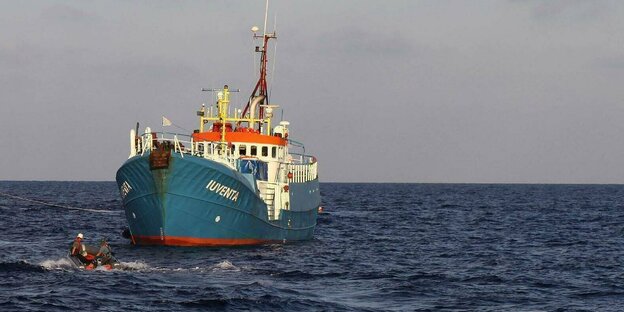A court in Trapani no longer wants to hold a main hearing against the accused maritime lifeguards. Follow the prosecutor's request.

There was not much rust then: the NGO Jugend's ship “Iuventa” rescued people off the coast of Libya during an operation in 2016 Photo: AlexanderStein/joker/imago
SEDAN taz | The court in Trapani (Sicily) on Friday dismissed the case against the crew of the German maritime rescue ship Iuventa. The trial, based on ongoing investigations since 2017, was the largest to date against maritime rescuers in the EU. The defendants were charged with smuggling and faced decades in prison.
“Our case is a symbol of the strategies that European governments are adopting to prevent people from reaching safety,” said defendant Sascha Girke. The “flawed and politically motivated investigations” resulted in people dying in the Mediterranean or being forcibly sent to war-torn Libya. “Meanwhile, our ship was left in ruins and we were dragged into a process that lasted years. The trial was part of a “public smear campaign against civilian maritime rescue,” which aimed to legitimize the crackdown on rescue activities.
The suspension already became evident after a hearing in February, the last of a total of 40. The three main witnesses did not remember their original statements. They were three former police officers who worked on another rescue ship in 2017 for a private security company with connections to the far-right Identitario movement. The accusation was based on his original statements, which accused Iuventa's team, among other things, of working with Libyan smuggling gangs. The defendants had always rejected him.
After the February hearing, the prosecution concluded that the events “did not constitute a crime” and that the main witnesses “were not credible.” The ship, confiscated in 2017, should be released again. A representative of the Italian Interior Ministry, who appeared as a co-plaintiff in the proceedings, said the decision on whether a main trial should be held was left to the court.
14,000 people saved
The actions revolve around two rescue operations: in September 2016 in Libyan territorial waters and in June 2017 in international waters. Initially, a total of 404 castaways were transported aboard the Iuventa of the German NGO Jugend Rettet. They were later taken to Italy on two ships belonging to the NGOs Doctors Without Borders and Save The Children.
The prosecution interpreted it as contraband. He accused the defendants of having “transported foreigners with criminal intent (…) for the purposes of illegal entry.” In addition to prison sentences, the defendants faced a fine of up to 15,000 euros per person taken to Italy. In total, “Iuventa” activists rescued just over 14,000 people from the water in 2016 and 2017. The boat set sail sixteen times for this purpose. The defendants participated in approximately half of these missions.
In August 2017, the Trapani prosecutor confiscated the Iuventa.
The ruling “will set a precedent for future cases,” said the European Center for Constitutional and Human Rights (ECCHR) in Berlin, after the preliminary hearing in Trapani that began in 2022. The decision goes “beyond the people directly accused and affects to all civil maritime rescue as an important pillar of solidarity with people who are fleeing,” the ECCHR said.
Amnesty International's Elisa De Pieri said the defendants saved lives and yet had been “shamefully dragged through Italian courts for years”. The prosecution had to “correct astronomical injustices and recognize the intrepid actions of the crew” who put their own lives at risk to save others. “The work of the Iuventa crew and others carrying out search and rescue operations at sea should never be penalized,” said De Pieri.
Criminalization is increasing
According to recent reports by the NGOs Borderline Europe and Picum, the criminalization of helpers and refugees is increasing significantly in the EU. Justice classifies humanitarian aid as contraband. Refugees accused of aiding and abetting the illegal entry of other refugees, for example by directing a boat, face especially harsh penalties.
On Monday, a court in Thessaloniki will again hear the case of Iranian cancer sufferer Homayoun Sabetara, accused of human trafficking. He was sentenced to 18 years in prison in 2022 because smugglers forced him to drive a minibus with other refugees from Turkey to Greece. Sabetara was also on the run. Human rights organizations have long reported that for every car or boat that arrives, at least one person is arrested and charged with smuggling.
